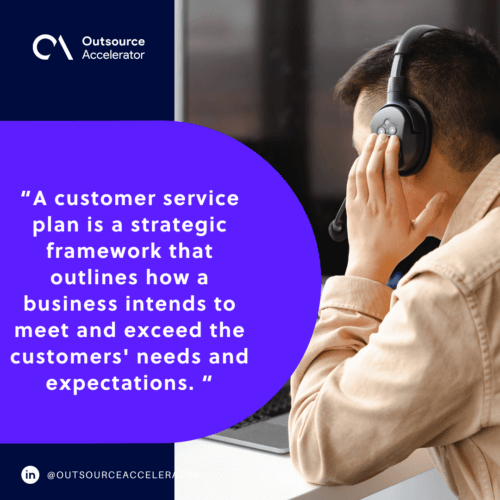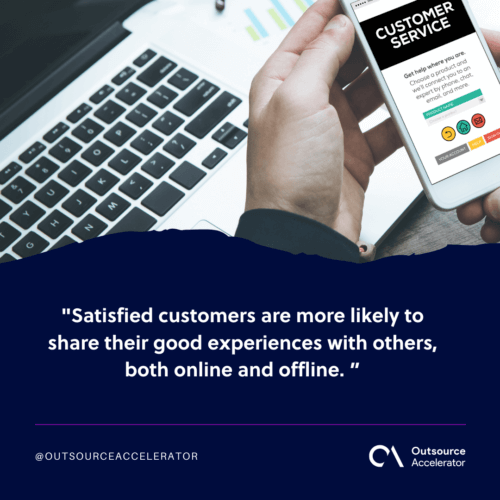Crafting an effective customer service plan in 9 simple steps

One fundamental truth remains constant in the business landscape: Exceptional customer service is the cornerstone of success.
A well-crafted customer service plan helps meet customer expectations, cultivate loyalty, and drive long-term success. This concept doesn’t just address issues as they arise but proactively shapes the entire customer experience.
This article aims to guide you through the process of creating a compelling customer service plan, offering insights to help you build a strong foundation for customer success.
What is a customer service plan?
A customer service plan is a strategic framework that outlines how a business intends to meet and exceed the customers’ needs and expectations.

It acts as a guide to ensure that companies are proactive in meeting customer demands and improving service offerings.
A well-designed customer service plan takes into account various factors, such as:
- Customer demographics
- Customer preferences
- Pain points
It encompasses various elements to enhance the overall experience, including:
- Communication channels
- Employee training
- Complaint resolution procedures
- Technology platforms
Ultimately, a customer service plan helps businesses create a customer-centric culture and sets clear guidelines for resolving issues effectively.
9 steps in creating a customer service plan
A well crafted customer service plan requires careful analysis, thoughtful consideration, and a strategic approach.
This section will outline the essential steps to follow in order to develop an effective customer service plan.
1. Understand your customer base
Before formulating a customer service plan, it’s important to have a deep understanding of your target audience. This involves identifying who they are, their needs, and how they prefer to interact with your business.
This can be done through the following methods:
- Market research
- Customer surveys
- Feedback analysis
The goal is to gather insights that will inform your customer service strategy.
2. Define your customer service objectives
After assessing your customers, it’s time to define your customer service objectives. Customer service plan objectives should align with your overall business goals and reflect what you aim to achieve.
Remember to set SMART goals to guide your initiatives effectively.
3. Establish service standards and policies
Setting service standards and policies is crucial when ensuring consistency and quality in customer interactions.
Define the level of service you aim to provide across various touchpoints, including:
- Inquiry response times
- Complaint resolution times
- Delivery quality standards
It may help to design a clear and consistent process that empowers CSRs to take ownership of customer issues and find appropriate solutions.
4. Develop communication channels
Effective communication is at the heart of exemplary customer service. It’s essential to identify and implement communication channels that align with your customers’ preferences and enable them to contact your business easily.
These can include:
- Phone support
- Live chat
- Social media
- Self-service options
For your customer service plan, choose the most suitable channels based on customer preferences, industry norms, and available resources.

5. Build a customer service team
Your customer service team is the frontline of your organization’s interactions with customers.
It’s critical to hire and train the right people. Invest in training programs to equip your staff with the information, abilities, and resources they require.
Alternatively, if hiring and training in-house teams is not for you, consider outsourcing to trusted outsourcing services providers like SixEleven BPO.
6. Implement feedback mechanisms
Customer feedback is invaluable for identifying areas of improvement and measuring the effectiveness of your customer service efforts.
Implement feedback mechanisms such as surveys, feedback forms, and online reviews to gather insights from your customers.
Analyze feedback data regularly to identify trends, address recurring issues, and make data-driven decisions to continuously enhance the customer experience.
7. Utilize technology to enhance delivery
Leverage technology solutions like the ones below to streamline and enhance your customer service processes:
- Implement customer relationship management (CRM) software to manage customer interactions, track customer data, and personalize communication.
- Explore automation tools, chatbots, and artificial intelligence (AI) to handle routine inquiries efficiently and free up your staff to focus on more complex issues.
- Utilize analytics tools to gain insights into customer behavior and preferences, allowing you to tailor your services accordingly.
8. Monitor and measure customer service performance
Regularly monitor and measure key performance indicators to evaluate the effectiveness of your customer service plan. These metrics may include:
- Customer satisfaction scores
- Response times
- Resolution rates
- Customer retention rates
Analyzing this data helps you optimize customer service operations and enhance the overall experience.
9. Continually improve and evolve
Customer expectations and market dynamics are constantly evolving, requiring businesses to adapt and innovate. Embrace a culture of continuous improvement and learning within your customer service team to ensure you continue to deliver value.
Benefits of a well-executed customer service plan
A well-executed customer service plan can bring numerous benefits to a business and its customers.
Here are some key advantages:
Enhanced customer satisfaction
A customer service plan focuses on meeting and exceeding customer needs, resulting in higher levels of customer satisfaction. It ensures that they receive prompt, personalized, and effective assistance whenever they interact with your business.
When they receive this kind of support, they’re more likely to develop a positive perception of the company and become loyal advocates. This leads to repeat business and referrals.
Improved brand reputation
Positive customer experiences are instrumental in shaping your brand’s reputation. Satisfied customers are more likely to share their good experiences with others, both online and offline.
This enhances the company’s image and credibility. With a customer service plan, you can create a strong brand reputation that attracts new customers and fosters loyalty among existing ones, contributing to sustainable business growth.

Increased customer retention
Investing in a customer service plan cultivates loyalty among your customer base. When they feel valued, understood, and supported, they are more likely to remain loyal to your brand and continue purchasing from you over time.
Loyal customers recommend your products and services to others and add to organic growth.
Competitive advantage
Exceptional customer service can become a powerful differentiator in today’s competitive marketplace. Customers are more likely to choose a brand that prioritizes their needs and delivers quality service consistently.
This can be especially beneficial for small and medium-sized organizations when competing against larger counterparts.
Better employee engagement
A customer-centric culture fosters employee engagement and satisfaction. When employees have clear guidelines, resources, and support to deliver service, they are more motivated, productive, and committed to their roles.
Higher customer lifetime value
Satisfied and loyal customers tend to spend more over their lifetime with your business.
By nurturing long-term relationships through excellent customer service, you can maximize customer lifetime value (CLV) and increase the revenue generated from each customer.
This is particularly beneficial for businesses operating in competitive markets where retaining customers is more cost-effective than acquiring new ones.
Overall, a well-executed customer service plan is essential to long-term success and sustainability. By investing in these steps, you can reap the numerous benefits mentioned above.







 Independent
Independent




